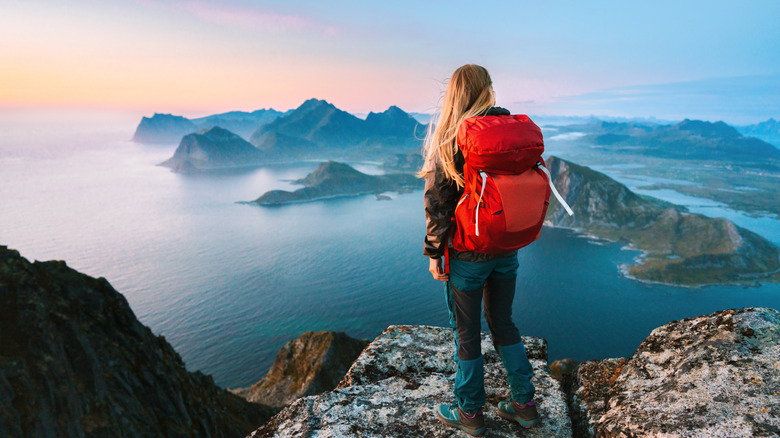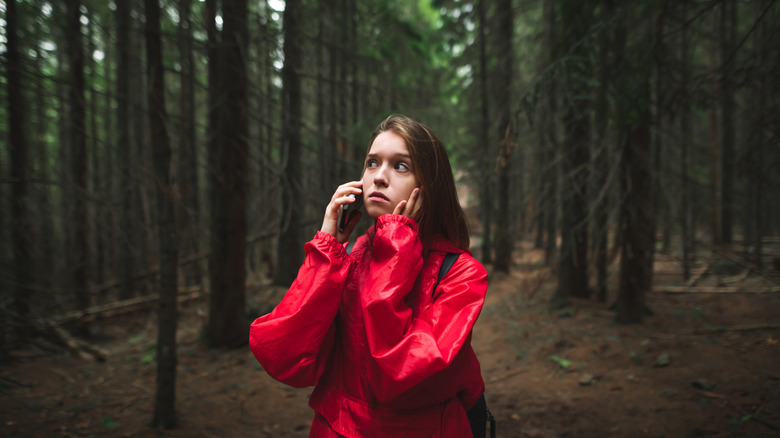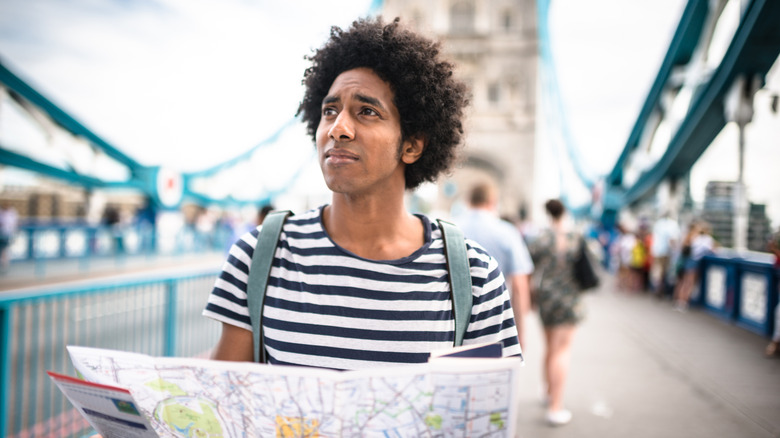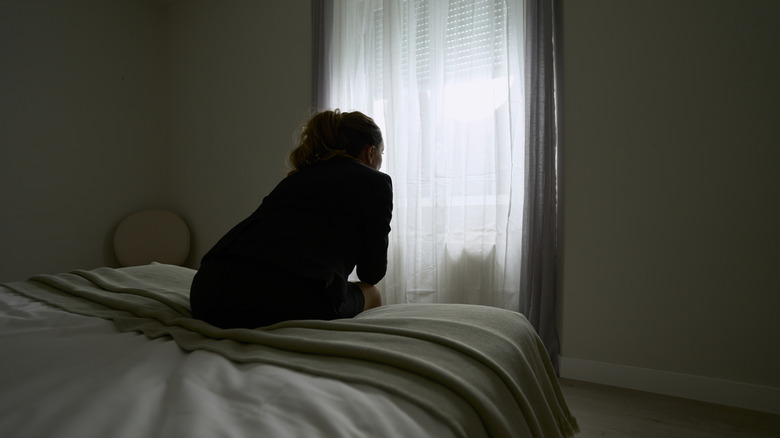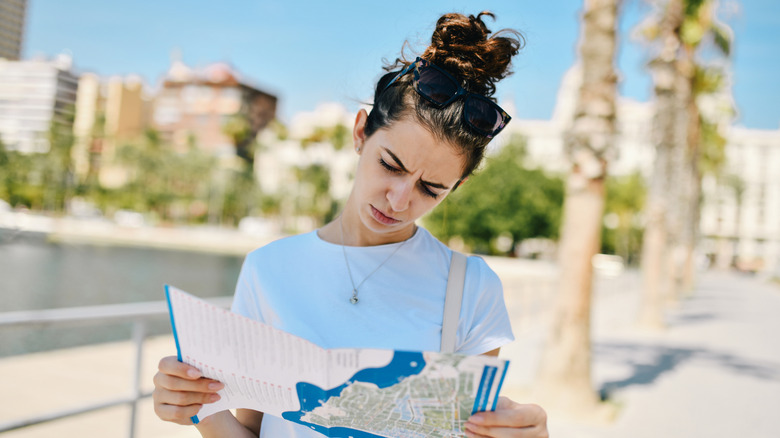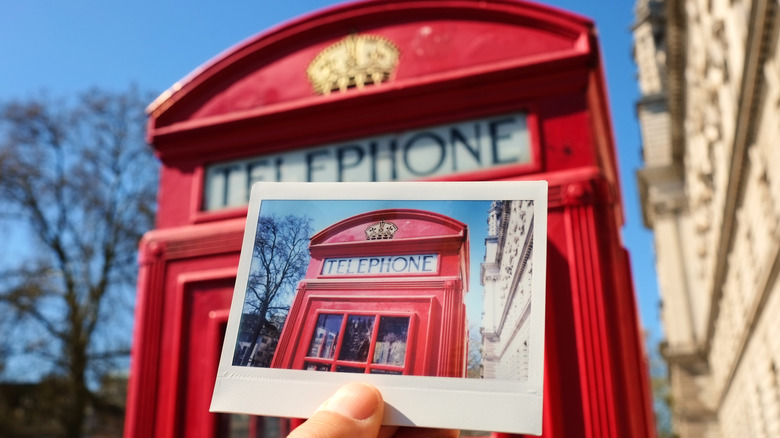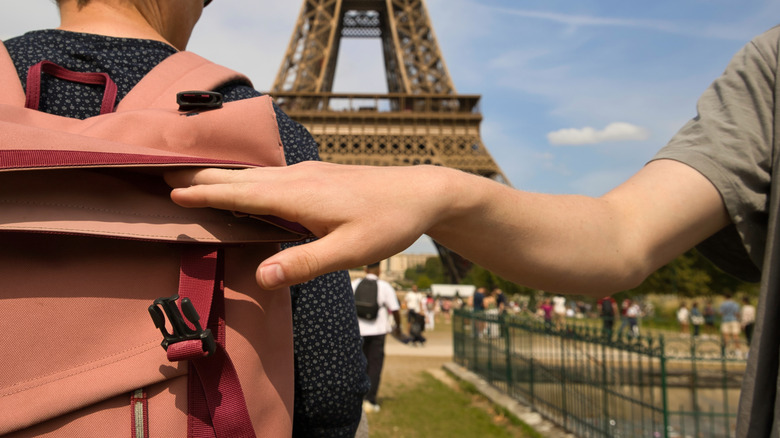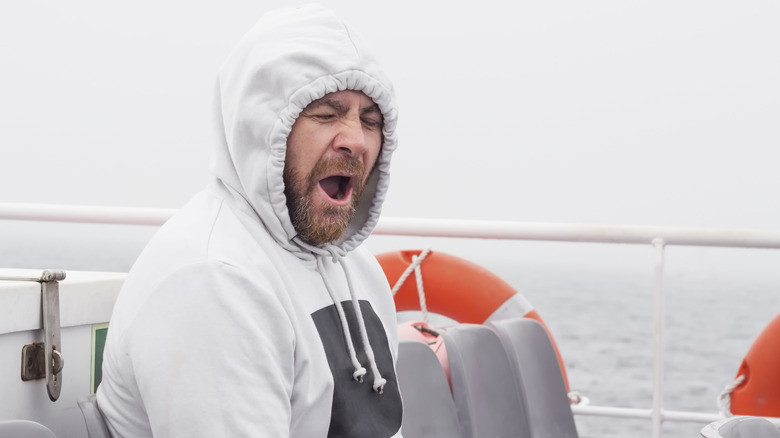10 Reasons Why You Might Want To Skip Adding Solo Travel To Your Bucket List
The internet is awash with ultimate guides on how to travel by yourself. There is talk of personal growth, freedom of the road, and the sense of achievement that comes with solo adventures. On your own, there are no compromises, detours to interest-adjacent landmarks, moments of asymmetric enthusiasm. You call the shots, set the tempo, and any mishaps, mistakes, or generic snafus are yours to own without recrimination or regret. It all sounds so idyllic.
And yet, those who have experienced such trials know that there are as many pitfalls to navigate as there are reasons to celebrate the experience. Embracing the challenge is all part of the charm, but it should be done with eyes wide open and thought given to the reality of what you are trying to carry out. Solo travel adds layers of complexity to any adventures that are difficult to ignore. Traveling alone requires planning, heightened levels of risk awareness, and a frank appraisal of your own capabilities.
Nothing on this list should prevent anyone from pursuing their dreams. On the contrary, with decades of solo travel behind me, I can confirm that all the clichés about finding oneself are true. But that does not mean it's for everyone, nor does it suggest that going on such a trip without giving it serious thought is a clever idea. Here then are some of those much-needed thoughts.
Safety
There is a reason there are so many lists telling you to avoid certain things when traveling solo, and that could be summed up in one word: safety. Indeed, a 2021 study published by JourneyWoman on barriers to independent travel found that 88% of women felt somewhat threatened or unsafe while traveling alone. Statista placed the figure at 68%, a number that reflects official cautions that independent travelers may face an increased risk of becoming a victim of crime.
Safety issues begin at the planning stage. Anyone traveling alone faces hazards, but the sad truth of the world we live in is that women are more at risk than men. Researching the best and safest destinations for women to travel alone is a great starting point, but there are other things to consider. Choosing reliable transportation, dressing modestly, and learning to trust your instincts are essential. Memorizing a few foreign language phrases is just as important as keeping a record of emergency contact numbers. Keeping an eye on the local news is recommended, and any official travel advisory warnings should be heeded to the letter.
The constant need to stay vigilant can get a little exhausting, and although planning can mitigate some of the danger, it cannot remove it entirely from the equation. If in doubt, join tour groups or head to crowded, well-lit areas. Because yes, safety in numbers applies even during solo travel.
Cost
At first glance, you could be forgiven for thinking that traveling alone is no more expensive than going as part of a couple or group. There is only one flight to pay for, one single-trip travel insurance policy to cover, and no extraneous activities to sign up for whatsoever. For solo travelers who know how to stay on a budget, such trips are simplicity itself.
Sadly, there are many hidden costs to consider. Single rooms in hotels are sometimes more expensive. Such costs begin with a 10% single-person surcharge and climb all the way up to double the cost of a shared room. Cruise ship cabins are no better, with some companies charging a single occupant 87% more per person than couples. Such hidden fees crop up in unlikely places. Tour buses sometimes charge extra for single tickets, as do many package holidays. The justification for the extra cost – usually stated as fixed operational activities such as cleaning, heating, and staffing –- makes sense. Still, that's of little comfort to your wallet.
Regardless, such charges are not inevitable. There are Airbnbs that cater to the independent traveler, and specialist outlets focused on solo travel can help you find better deals. But again, the extra layer of hassle sometimes proves too much for some. It all boils down to individual tastes. For some, the additional expense is a price they're willing to pay for a once-in-a-lifetime experience. For others, it's just not quite bucket list worthy.
Loneliness
While there is little question that travel broadens the mind, traveling on your own can be a lonely affair. Cruises are filled with couples, tourist hotspots are thick with groupthink, and few places are designed with independent travelers in mind. True, certain vacations bring people together more: small-scale ski lodge breaks, singles cruises, and the odd curated tour guides exist. But such things remain a minority niche affair. So, while you can plan the perfect ski trip to make new friends, what if you lack the confidence to approach people or get along with them? Even at the ever-popular but ultimately overcrowded European tourist spots, it can be difficult to make friends. In such instances, loneliness tends to rise as if from nowhere. If not properly managed, it may come to dominate the entire vacation.
Back home, we are surrounded by others. Getting away from it all might well be the motivation for the trip in the first place, but the human mind has a way of missing irritants if given enough time to ponder them. Dealing with such feelings is certainly tricky. Acceptance is the first step. Yes, you'll probably get lonely. And when the inevitable occurs, it's time to get a little proactive.
Joining a day tour can give those hidden, gregarious corners of your psyche a much-needed top-up. Staying busy and checking in with home, assuming you're in a built-up area with cell phone reception, are also great ways of staving off feelings of isolation. And if all else fails, figuring out how to meet people while solo traveling oftentimes just takes a little time, patience, and practice.
Fear and anxiety
Traveling alone, as we have seen, comes with a certain amount of added jeopardy. According to a 2025 study published by Travel Industry Today, one in three solo travelers abroad has fallen victim to theft, scams, or some other crime. While that number might seem high, it indicates that travelers are, for the most part, safe. After all, taking precautions brings one closer to the much-desired safety margin.
With due diligence completed, research notes tucked away in your backpack, and emergency numbers memorized. There's little that can go wrong, and yet, still, the mind plays tricks. A wrong turn down a dark street. A local who feels a little too eager to help. Bumps in the night that may or may not be a ravenous bear or ax-wielding maniac. Sure, most of the time, the wind is to blame, but that's cold comfort in the middle of the night when fear gets its claws into you.
A vacation spent in intermittent panic over the slightest of unexpected events is no vacation at all. Everyone experiences anxiety in their own way, and yes, some people are more susceptible than others. You might not discover which category you belong to until deep into your first trip. The emotional stages you find yourself passing through can be disorientating to say the least. Thankfully, they are transitory. Most people, as days pass, begin to relax. Decisions taken lead to adventure, not mishaps, and as the green shoots of confidence take root, anxiety tends to fade into the ether like unwanted baggage.
Decision fatigue
It's fun to think of ourselves as beings of unlimited self-sufficiency rolling through life as an unstoppable wave of independent thought. Beholden to no one, we make our own plans, do as we please, and waste no time second-guessing the universe's plan for us — if it even has one at all. It's fun, alright, but also not true. We live in a rule-based society, actions have consequences, and our lives are mediated by the ever-present specter of responsibilities. Society sets speed limits, and employers issue deadlines. Friends bicker about where to dine out, and parents call to remind us to wish Aunty Val a happy birthday. There are packed lunches to make and dates in the calendar to set aside. And on those rare occasions where we find ourselves unambiguously in charge of our own destiny, it is often little more than a fleeting affair.
Not so when it comes to solo travel; part of the joy of travel is the spontaneity it brings. Where to go next, what to eat, which must-see attractions to visit, and which to avoid. Alone, every decision is yours to make, and while that means you never have to compromise, it can be exhausting. Decision fatigue is a genuine medical phenomenon, one that is often triggered while traveling alone.
Without the constant back-and-forth negotiation between fellow travelers, a kind of paralysis can set in. Exhausted, such moments of intense indecision can quickly turn into procrastination and lethargy. Avoiding such pitfalls, however, is simply a matter of planning. True, an itinerary detracts from the impulsiveness of any given moment, but if treated as a guide, they can offer much-needed respite when it's time to set the brain to autopilot.
Endless selfies
Photos are an integral part of any vacation. They serve as a reminder of past times and as a way of communicating your experience to others. In some cases, they even act as an anchor around which future travels are planned. Posted images are a projection of our lives taken from the most flattering of angles, a detour towards the windswept and interesting.
Solo travelers have fewer options than most when it comes to capturing these moments. Selfies are the go-to choice, of course, as is a series of shots of the attraction. Sadly, oftentimes, such photos lack emotion: the fixed smile is no substitute for a fit of giggles, and the composite angle that repeats with monotonous regularity is hardly food for the soul. Even when visiting the most Instagrammable destinations in the world, solo imagery, unfairly, carries a narcissistic taint. Or perhaps only the promise of one.
True, you can request others to take the odd picture or two to mix things up, but that can be an exhausting process, too. Tips abound: asking the right stranger to frame the shot for you is a skill that you'll need to master. Choosing places known for their incredible travel photos is also of great help, since there will be many people willing to assist you to get the perfect shot in return for a little reciprocity. There are other solo travelers out there, too! Such thrill seekers are happier than most to take turns crafting that perfect holiday shot.
Memories
Even those who have mastered the art of taking photos while traveling solo have an additional hurdle to navigate: a lack of shared memories. "You had to be there" — is a common refrain for a reason: that character you met at the airport, the sunrise that brought a tear to your eye, those odd flashes of blessed spectacle you'll never forget. Such moments are the very definition of nostalgia, yet, for the solo traveler who has nobody to reminisce with, the recollection fades.
This emotional synchronicity — or rather the lack of it when traveling alone — is a well-understood phenomenon. Humans experience an increased sense of well-being when sharing experiences with others. This is in part thanks to the simple fact that the neurochemical response received via gregarious activity is more robust than that of a solo event. But there is more to it than simple chemistry.
Memories are fickle and elusive things that tend to fade over time. Humans are narrative-building creatures by their very nature, and we consolidate experiences via our most impressive invention: language. Reminiscing keeps memories alive by bringing a fresh perspective to the proceedings. Just talking about such shared experiences brings vibrancy back to the moment. Of course, it's not all bad news. Traveling alone is often a way of meeting new people, and in doing so, you create shared memories of your own. Your social legacy may well expand as new friends are added to your social circle. The communal echo of your journey can be a self-refreshing experience. And all the more poignant for it.
Judgment
Have you ever felt self-conscious eating alone in a restaurant? Does the thought of queuing up for a ticket fill you with dread? Worry not, you're not alone, no pun intended. Society often defines people based on group dynamics. Staying in and watching a movie alone carries a low-grade stigma; arriving at a wedding without a plus one is frowned upon. At times, just being single can make people feel like a pariah, like they have somehow failed to fully embrace the unspoken rules of society. The mere mention of a solo vacation seems to amplify such judgements; people look askew, family worry about your safety, and even close friends may attempt to talk you out of it.
On the trip itself, dining alone is sometimes more of a hassle than it ought to be; some restaurants demand pre-booking, and it's not unheard of to discover a two-person minimum attached to such reservations. Oh, and bus tours may not accommodate odd numbers of travelers, and the odd looks you get at ticket offices don't help matters one little bit. Of course, it doesn't have to be that way. Stigmas are there to be challenged. As people offer sideways glances or as parents voice their concerns, an opportunity for self-affirmation presents itself. Yes, you're going alone, and no, you don't want to be set up on a date with that nice boy from the office. The solo trip does not have to be an assertion of personal failings. Those judging your decisions probably deserve a polite but firm rebuttal.
A second pair of eyes
There's no question that safety is the main concern for those traveling alone and that feelings of anxiety simply complicate matters. There are, however, a whole range of things that can occur during travel that, while not explicitly dangerous, can nonetheless ruin an otherwise perfect vacation. Indeed, you are far more likely to experience non-violent crimes — specifically theft — while on vacation than any actual threat to your person. And anyone seen to be traveling solo is an obvious mark.
It's one thing to follow a guide to exploring London alone, and quite another to experience the 316% spike in robberies the Underground experiences during tourist season, according to a 2023 report by Transport for London. With nobody to watch their backs, solo travelers have to be extra vigilant. Alone, there is nobody to watch your stuff while you nip into a lavatory, no second opinion to filter out the scams, and no alternative set of instincts to fall back on when things start to look fishy. Touts get pushier when they sense you have no backup, and any sense of loneliness you may feel has the potential to impair judgment in the presence of a seemingly friendly face.
It is, however, mostly a matter of perspective. Those who have planned for a solo trip have usually taken precautions designed to cut such unpleasantries off at the pass. Traveling light so you don't have to drop your bags to the ground every 10 minutes. Ensuring money is secured in inaccessible places. Keeping your phone out of sight or secured to your wrist via a strap. Solo travel has the potential to create an extra veneer of protection powered by the reality of self-reliance. It's an intimidating prospect to be sure, but a challenge well worth overcoming.
Boredom
If there is a purpose to travel beyond a simple broadening of your horizons, it can be boiled down to one metric: fun. Not that vacations are supposed to be an exercise in pure pleasure. True, there is a complete guide to packing light out there waiting to be discovered, but there's also the last-minute stress preparations to contend with. Long-haul flights are exhausting, airport stopovers are tedious, and at the end of it all, you have to go through it again, only this time in reverse. Still, it's obviously worth it; the tourism industry wouldn't be worth an excess of $11 trillion if it weren't, according to the World Travel & Tourism Council.
The solo traveler has more to contend with than those traveling in groups of two or more. Meals taken alone, long bus rides to exotic locales with only a book for company. Whole days spent without ever having a real face-to-face conversation. For some solo explorers, it can get a little dull at times.
Thankfully, it does not have to be that way. A positive mental attitude goes a long way to combating any encroaching monotony. Filling your day with activities and sensing when you need to tag along with others in order to give the old socialization muscles a stretch is of immense benefit. Multi-day tours bring groups together quite naturally, and other tricks of the trade — such as frequenting the same café and getting to know the staff — help deal with both boredom and isolation.
